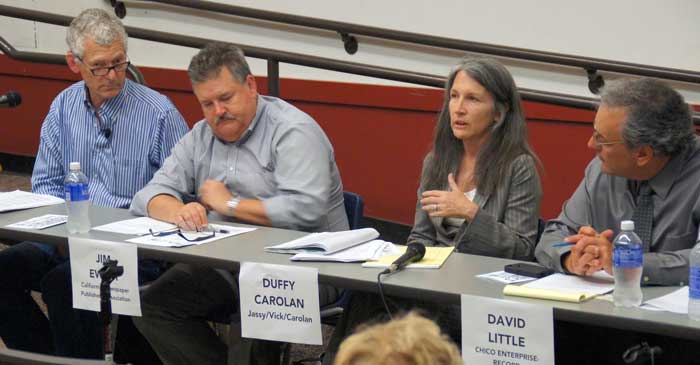
A panel of media experts and lawyers spoke on Monday to an audience at Chico State about free speech issues ranging from police body cameras to protection for hate speech.
The panel consisted of five media experts from various backgrounds and was moderated by Peter Scheer, the executive director of the First Amendment Coalition.
The panel discussed multiple issues pertaining to free speech and the First Amendment, as well as how those practices and laws affect how journalists report the news.
The discussion kicked off with the subject of obtaining records from police departments.
Duffy Carolan, an attorney for Jassy/Vick/Carolan LLP, said that within California, it is incredibly hard to obtain case records from the police.
“California can withhold records even after the case has been closed, which is unfortunate,” Carolan said.
The discussion then introduced the issue of body cameras on police officers and whether the video captured by these cameras should be public record as well.
Although body camera footage should be public record, departments across the state are still developing those policies, said Jim Ewert, general counsel for the California Newspaper Publishers Association.
“There are six body camera bills in front of the state legislature right now,” Ewert said.
Ewert also brought up the struggle that citizens face when attempting to film or photograph law enforcement in public. Often times law enforcement officials will seize the device the citizen is using to document them and erase the footage or just outright destroy the device, he said.
According to Ewert, SB-411 is a bill currently in the Legislature that if made law would help to correct this issue.
“The bill basically says that anyone who is in a place where they have a legal right to be can film or photograph law enforcement without fear of being prosecuted,” he said.
The next topic in the discussion dealt with public and government officials and their email conversations. There seemed to be a consensus between the audience and the panel that all official business communicated through public email addresses was public record.
The last topic was the First Amendment protection of hate speech. To start the conversation, Scheer brought up the recent controversy involving a University of Oklahoma fraternity’s racist chant, which ended up getting three members expelled.
The main question of this discussion was whether or not the First Amendment should protect hate speech. As far as the panelists were concerned, that answer was yes.
The panelists believed that the fraternity members who led the chant should not have been expelled from the university based on their views regardless of how racist those views are.
“We don’t want our government to tell us what (free speech) is allowed and what isn’t,” Carolan said.
For those who wish to find out more information about the First Amendment Coalition, please go to its website firstamendmentcoalition.org.
Austin Redfern can be reached at [email protected] or @theorion_news.








